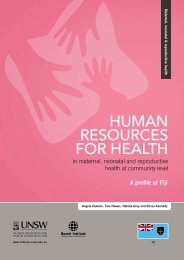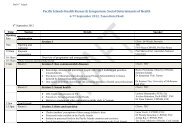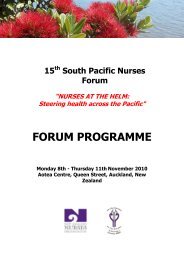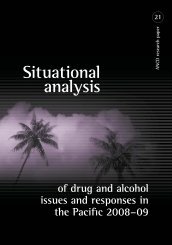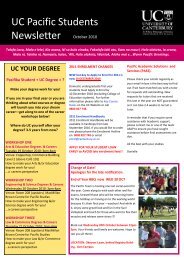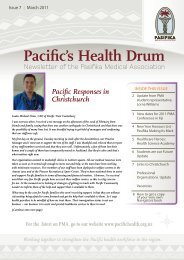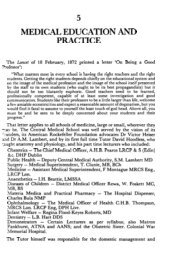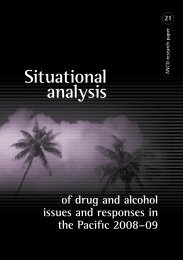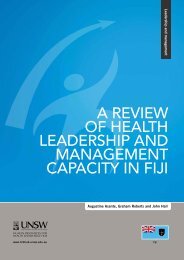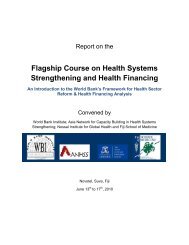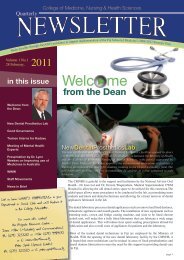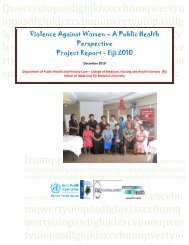improving the quality of hrh information - HRH Knowledge Hub ...
improving the quality of hrh information - HRH Knowledge Hub ...
improving the quality of hrh information - HRH Knowledge Hub ...
Create successful ePaper yourself
Turn your PDF publications into a flip-book with our unique Google optimized e-Paper software.
In a decentralised health system <strong>the</strong> district is essential to <strong>the</strong><br />
implementation <strong>of</strong> services and management <strong>of</strong> resources<br />
including staff in MNRH at community level. Target setting<br />
and accountability in this area are also important tasks for<br />
district managers who require quick access to accurate<br />
<strong>information</strong>.<br />
At district level <strong>the</strong> development <strong>of</strong> a system <strong>of</strong> <strong>information</strong>ga<strong>the</strong>ring<br />
for monitoring and evaluating community-level<br />
personnel and <strong>the</strong>ir performance is critical. This requires <strong>the</strong><br />
development <strong>of</strong> standard indicators for reporting which will<br />
feed into health systems assessment and mapping progress<br />
towards MDG 5. Effective district management, leadership<br />
and <strong>quality</strong> improvement processes are central to <strong>information</strong><br />
systems which can be built through appropriate training for<br />
managers as well as community-level staff who are involved<br />
in data collection. In addition, <strong>the</strong> non-state sector and <strong>the</strong><br />
public need to be engaged so that data is comprehensively<br />
collected using standard indicators.<br />
This process will enable <strong>the</strong> collection <strong>of</strong> data about<br />
personnel employed in <strong>the</strong> private and NGO sector as well as<br />
informal, lay or volunteer workers. Innovative approaches to<br />
collecting and sharing <strong>the</strong>se data could be utilised such as<br />
mobile phone technology, especially in remote or difficult-toaccess<br />
locations. It also should be noted that both qualitative<br />
and quantitative <strong>HRH</strong> <strong>information</strong> needs to be collected.<br />
Descriptive data will help to understand <strong>the</strong> behaviour <strong>of</strong><br />
health workers, <strong>the</strong>ir needs and <strong>the</strong> socio-cultural context.<br />
Effective district management, leadership<br />
and <strong>quality</strong> improvement processes are central<br />
to <strong>information</strong> systems which can be built<br />
through appropriate training for managers as<br />
well as community-level staff who are involved<br />
in data collection.<br />
Donors and NGOs need to not only be engaged in <strong>the</strong><br />
collection and analysis <strong>of</strong> <strong>HRH</strong> <strong>information</strong> related to<br />
MNRH programs that <strong>the</strong>y are funding and/or managing at<br />
community level, for <strong>the</strong>ir own planning needs, but <strong>the</strong>y also<br />
require access to wider community-level <strong>HRH</strong> <strong>information</strong>.<br />
This is necessary to ensure that national, provincial and<br />
district <strong>HRH</strong> policy, regulation and legislation is complied<br />
with and that workforce commitments are in line with district<br />
needs and plans. <strong>Knowledge</strong> <strong>of</strong> government planning enables<br />
donors and NGOs to make investments that are consistent<br />
with <strong>the</strong> goals <strong>of</strong> aid effectiveness.<br />
Although health workers at village and sub-district level and<br />
those acting as district managers are <strong>the</strong> key personnel<br />
involved in <strong>the</strong> collection <strong>of</strong> <strong>information</strong> concerning personnel<br />
engaged in <strong>the</strong> provision <strong>of</strong> MNRH, clear links need to be<br />
maintained with <strong>the</strong> provincial and national levels.<br />
Long-term plans requiring additional resources may need<br />
to be presented to provincial level, with data justifying <strong>the</strong><br />
need. Allocation <strong>of</strong> district funds may be made at provincial<br />
level and requests for additional resources made to national<br />
Ministry <strong>of</strong> Health or Ministry <strong>of</strong> Finance and Treasury. Health<br />
workers at community level must be aware <strong>of</strong> <strong>the</strong> national,<br />
district and provincial policy, regulation and legislation that<br />
concerns <strong>the</strong>ir scope <strong>of</strong> practice. They must also be given<br />
<strong>the</strong> opportunity, through a regular system <strong>of</strong> consultation,<br />
to feed into <strong>the</strong> on-going revision <strong>of</strong> policy, regulation and<br />
legislation so <strong>the</strong>y remain relevant and responsive to MNRH<br />
at community level.<br />
Improving <strong>the</strong> <strong>quality</strong> <strong>of</strong> <strong>HRH</strong> <strong>information</strong> Discussion paper 1<br />
Angela Dawson<br />
15



